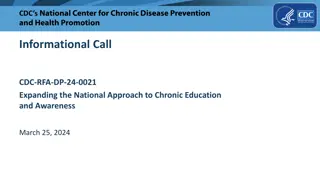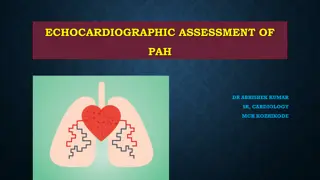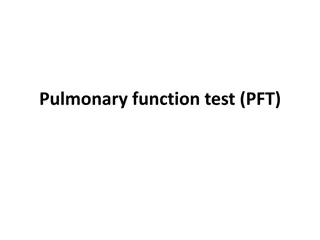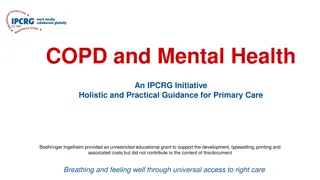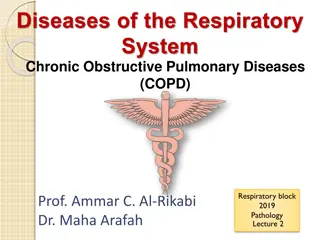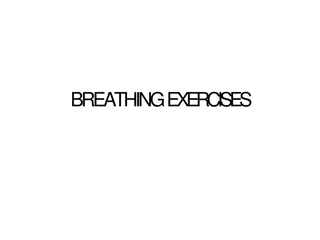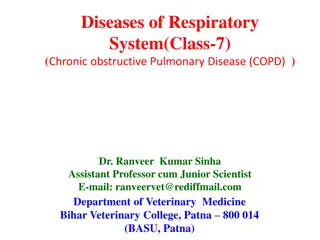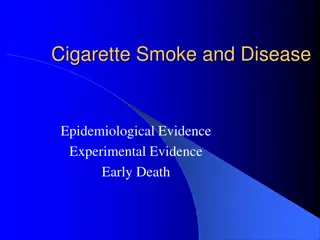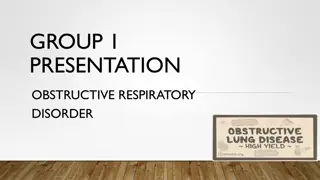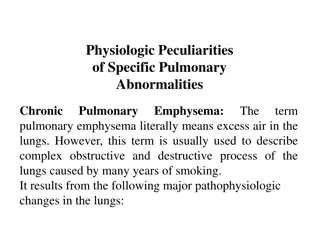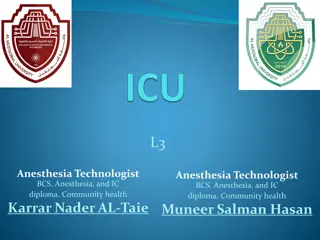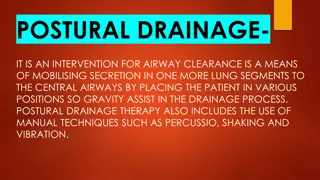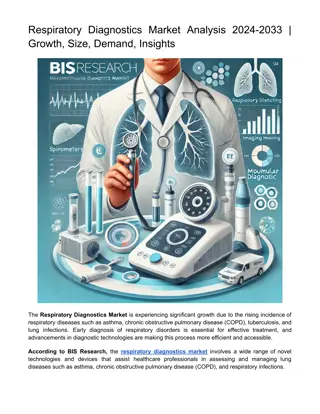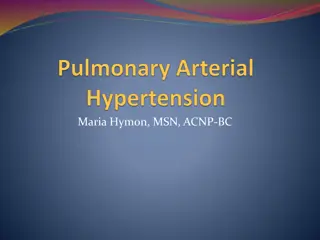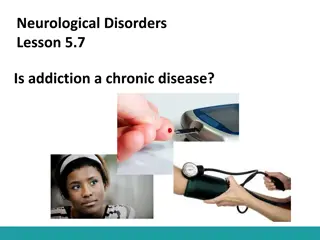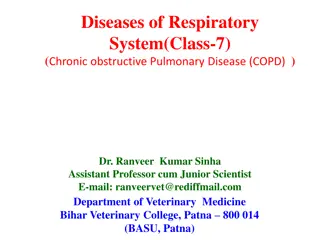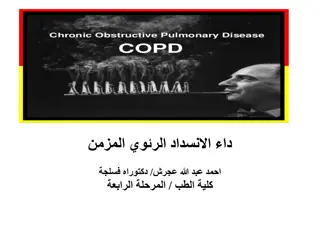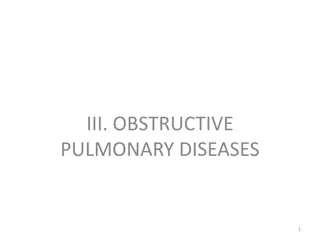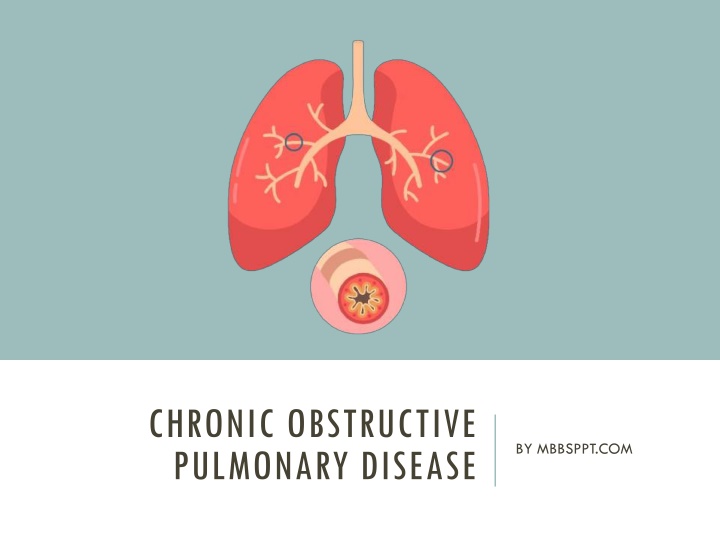
Chronic Obstructive Pulmonary Disease (COPD)
Chronic Obstructive Pulmonary Disease (COPD) is a lung condition primarily caused by smoking that manifests as chronic bronchitis and emphysema. Learn about the symptoms, causes, diagnosis, and treatment options for COPD to improve your lung health and quality of life.
Download Presentation

Please find below an Image/Link to download the presentation.
The content on the website is provided AS IS for your information and personal use only. It may not be sold, licensed, or shared on other websites without obtaining consent from the author. If you encounter any issues during the download, it is possible that the publisher has removed the file from their server.
You are allowed to download the files provided on this website for personal or commercial use, subject to the condition that they are used lawfully. All files are the property of their respective owners.
The content on the website is provided AS IS for your information and personal use only. It may not be sold, licensed, or shared on other websites without obtaining consent from the author.
E N D
Presentation Transcript
CHRONIC OBSTRUCTIVE PULMONARY DISEASE BY MBBSPPT.COM
INTRODUCTION Chronic Obstructive Pulmonary Disease (COPD) is a lung disease that makes it hard to breathe. It is caused by damage to the lungs over many years, usually from smoking. COPD is often a mix of two diseases: 1. Chronic bronchitis: In chronic bronchitis, the airways that carry air to the lungs get inflamed and make a lot of mucus. This can narrow or block the airways, making it hard for you to breathe. 2. Emphysema: In emphysema, these air sacs are damaged and lose their stretch. Less air gets in and out of the lungs, which makes you feel short of breath.
SYMPTOMS COPD symptoms often don't appear until significant lung damage has occurred, and they usually worsen over time, particularly if smoking exposure continues. For chronic bronchitis, the main symptom is a daily cough and mucus (sputum) production at least three months a year for two consecutive years. Other signs and symptoms of COPD may include: Shortness of breath, especially during physical activities. Wheezing. Having to clear your throat first thing in the morning, due to excess mucus in your lungs. Lack of energy. People with COPD are also likely to experience episodes called exacerbations, during which their symptoms become worse than usual day-to-day variation and persist for at least several days.
CAUSES The main cause of COPD in developed countries is tobacco smoking. In the developing world, COPD often occurs in people exposed to fumes from burning fuel for cooking and heating in poorly ventilated homes. In the vast majority of cases, the lung damage that leads to COPD is caused by long-term cigarette smoking. Other irritants can cause COPD, including cigar smoke, secondhand smoke, pipe smoke, air pollution and workplace exposure to dust, smoke or fumes. In about 1 percent of people with COPD, the disease results from a genetic disorder that causes low levels of a protein called alpha-1-antitrypsin. Alpha- 1-antitrypsin (AAt) is made in the liver and secreted into the bloodstream to help protect the lungs.
DIAGNOSIS Lung (pulmonary) function tests: Pulmonary function tests measure the amount of air you can inhale and exhale, and if your lungs are delivering enough oxygen to your blood. Spirometry is the most common lung function test. During this test, you'll be asked to blow into a large tube connected to a small machine called a spirometer. This machine measures how much air your lungs can hold and how fast you can blow the air out of your lungs. Chest X-ray: A chest X-ray can show emphysema, one of the main causes of COPD. An X-ray can also rule out other lung problems or heart failure. CT scan. Arterial blood gas analysis. Laboratory tests.
TREATMENT Quitting smoking is the most important thing you can do to slow the disease and improve your quality of life. Other things you can do that really make a difference including eating well, staying active, and avoiding triggers. Medicines: Bronchodilators : Bronchodilators are used to open or relax your airways and help your shortness of breath. They are : Anticholinergics (such as ipratropium). Beta2-agonists (such as albuterol or levalbuterol). Corticosteroids (such as prednisone) may be used in pill form to treat a COPD flare-up or in an inhaled form to prevent flare-ups. They are often used if you also have asthma.
TREATMENT If COPD gets worse, you may need other treatment, such as: Oxygen treatment: This involves getting extra oxygen through a face mask or through a small tube that fits just inside your nose. It can be done in the hospital or at home. Treatment for muscle weakness and weight loss: Many people with severe COPD have trouble keeping their weight up and their bodies strong. This can be treated by paying attention to eating regularly and well. Surgery: Surgery is rarely used for COPD. It's only considered for people who have severe COPD that has not improved with other treatment.

